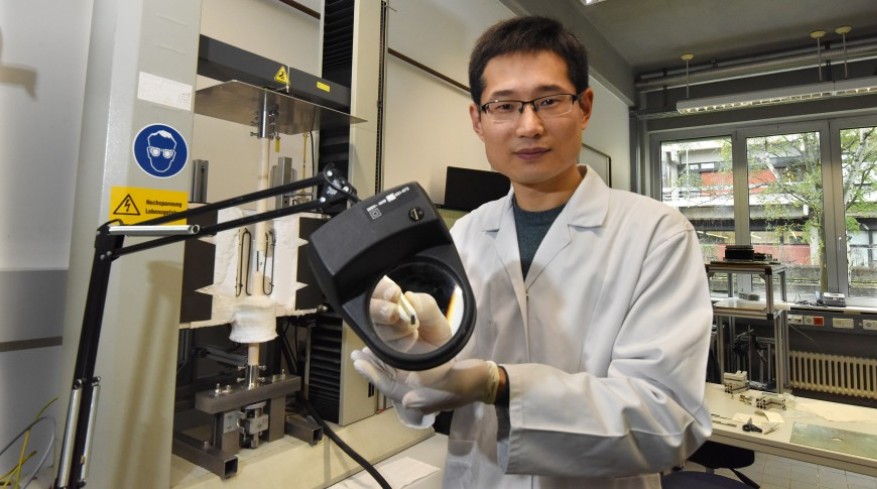Atomic channels through the crystal
ERC Starting Grant for TU project MECERDIS by materials scientist Dr Xufei Fang
2022/11/28 by Astrid Ludwig
The MECERDIS research project at the Technical University of Darmstadt is awarded an ERC Starting Grant by the European Research Council. Dr Xufei Fang's work is being funded with around 1.5 million euros. The TU materials scientist is researching improved ceramic materials that will enable new applications.

Ceramic materials have become an indispensable part of our daily, modern lives. They are used everywhere – in mobile phones, laptops, computers, for sensors and capacitors or even in aerospace. The materials are very versatile, but also very demanding because they are hard and break easily. This is why TU materials scientist Dr Xufei Fang is researching a new generation of ceramics that possess plastic ductility and also open up new application possibilities thanks to a specifically modified crystal structure.
The young TU scientist's pioneering work is now being funded by the European Research Council with an ERC Starting Grant. For five years, the EU is supporting his project MECERDIS (Mechanics-tailored Functional Ceramics via Dislocations). “A great opportunity”, the 33-year-old is delighted to say. Xufei Fang was already selected and funded by TU Darmstadt as an Athene Young Investigator in 2019 for his basic research.
A targeted disruption of the atomic structure
Ceramics consist of ionic and covalent bonds that make the material hard, but also brittle and easily breakable. To improve the material and make it more flexible, the TU scientist relies on a targeted disruption of precisely this atomic structure. He deliberately builds in defects in which several atoms are missing in the otherwise regular crystal lattice of the ceramic material. These so-called dislocations, one-dimensional defects, run as straight or curved lines right through the crystal of the ceramic material and can be used as a channel, for example to incorporate oxygen or also to act as a brake for heat propagation. According to Xufei Fang, it has been possible to prove that these dislocations are also suitable for superconductivity or electrical charges, which makes them interesting for energy generation and a higher efficiency of fuel cells.
However, due to the brittleness of the material, it has so far been difficult to insert these channels into the ceramics in a planned manner. “This is the critical point of research and future dislocation technology”, says Xufei Fang. The MECERDIS project, which is now being funded, is intended to bring about crucial progress. The materials scientist is working on making the dislocations controllable and the ceramics more malleable at the same time. He wants to achieve this with a variety of methods, including electrical voltage, light irradiation, mechanical and thermal processes. The aim of his research is to create stable, selectively placeable plastic zones of millimetre dimensions with a high dislocation density. And inventing a novel ceramic material that does not deteriorate as quickly and has a higher fracture tolerance. “That would open up completely new application possibilities”, says the TU scientist with confidence.
About the person
Xufei Fang studied aerospace engineering at China's Tsinghua University in Beijing. There he earned a doctorate in mechanics, but later opted for materials science. from 2016 to 2019, he worked as a postdoc with an Alexander von Humboldt Fellowship at the Max Planck Institute for Iron Research in Düsseldorf. In April 2019, Fang became a group leader at TU Darmstadt in Prof. Jürgen Rödel's ceramics group in a Koselleck project funded by the DFG. in 2019, TU Darmstadt selected him as one of its Athene Young Investigators. Since 2021, the 33-year-old has also been a visiting associate professor at the Department of Mechanical Science and Bioengineering at Osaka University in Japan.
Background
ERC Starting Grants are awarded by the European Research Council to researchers from all disciplines up to seven years after their doctorate. With this award, the European Union aims to promote outstanding research and young scientists. The Starting Grant is aimed at researchers at the beginning of their career who have already produced excellent work and would like to establish their own independent research or working group.
